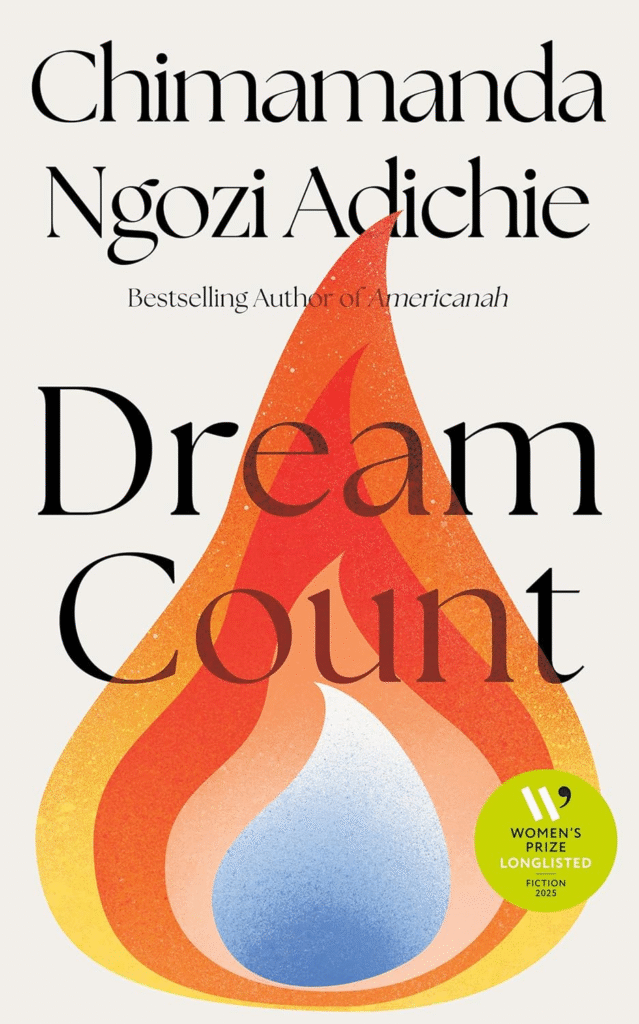Chimamanda Ngozi Adichie’s Dream Count arrives as a major literary moment, from a writer whose novels have long shaped conversations about love, identity, and belonging. Published on 4 March 2025, this instant Sunday Times bestseller is already longlisted for the Women’s Prize for Fiction 2025. Following the worldwide acclaim of Americanah and Half of a Yellow Sun, Adichie returns after a decade with a work that feels both intimate and expansive. As she herself has said, “Novels are never really about what they are about” and this one proves the truth of that statement.

At the heart of the story are four women; Chiamaka, Zikora, Omelogor, and Kadiatou whose lives are intertwined through friendship, blood, and circumstance. Chiamaka, a Nigerian travel writer in America, reflects on past relationships during the pandemic, while Zikora confronts family loyalty after betrayal. Omelogor wrestles with identity and cultural debates between Nigeria and the United States, and Kadiatou fights for dignity as an immigrant mother in a society shaped by inequality. Through them, the novel explores themes of love, motherhood, migration, and the choices women face in a world that is constantly changing.
With lyrical prose and unflinching compassion, Chimamanda Ngozi Adichie creates characters who feel urgent and alive on the page. The narrative moves gracefully between private memory and social critique, offering questions rather than easy answers. More than just a new release, the book is a deeply emotional and thought-provoking work that asks what it means to be truly known, to love without compromise, and to endure hardship with strength.
Read Also: Aghori: An Untold Story | Mayur Kalbag | Book Review
Book Availability and Details
Dream Count by Chimamanda Ngozi Adichie is published by Fourth Estate and released on 4 March 2025. The novel is written in English and comes in 416 pages. Readers can get it in multiple formats the Kindle edition is priced at ₹361, the paperback at ₹379, and the hardcover at ₹775. The audiobook version is available for free, making it easy to enjoy in different ways.
The book can be purchased online through popular platforms like Amazon, Flipkart, and major bookstores, as well as directly from publisher outlets. With several formats to choose from, readers can pick the edition that suits their preference, whether they enjoy digital, print, or audio.
Read Also: Forest of Noise | Mosab Abu Toha | Poetry of Gaza
About the Author of Dream Count
Chimamanda Ngozi Adichie, born in Enugu, Nigeria in 1977, is one of the most influential contemporary writers whose work has reached readers across the world. Her books have been translated into more than 55 languages, and her essays and stories have appeared in leading publications such as The New Yorker and The New York Times.

Adichie’s first novel, Purple Hibiscus, won the Commonwealth Writers’ Prize and the Hurston/Wright Legacy Award, introducing her as a powerful new literary voice. She gained international recognition with Half of a Yellow Sun, a novel set during the Nigerian Civil War, which won the Women’s Prize for Fiction and was later named the “Winner of Winners.” Her third novel, Americanah, won the National Book Critics Circle Award and became a global bestseller for its thoughtful exploration of race, migration, and identity.
Alongside her novels, Adichie has published short stories and widely read essays. Her collection The Thing Around Your Neck showcased her storytelling skill, while We Should All Be Feminists and Dear Ijeawele shaped conversations on gender equality and feminism worldwide. She has also written Notes on Grief, a deeply personal reflection on loss, and Mama’s Sleeping Scarf, her first children’s book.
Adichie’s literary achievements have earned her major honor, including the MacArthur Fellowship in 2008 and a place on Time magazine’s list of the 100 Most Influential People in 2015. She divides her time between Nigeria and the United States, continuing to inspire readers with her sharp insights, human stories, and fearless voice.
Read Also: James | Percival Everett | Book Review
Themes in Dream Count by Chimamanda Ngozi Adichie
- Love, Desire, and the Search for Fulfillment: At its core, Dream Count is a meditation on love in its many forms that is romantic, maternal, and self-directed. Adichie’s characters reveal how fragile love can be when tangled with ambition, regret, and longing. Chiamaka’s reflections on her past lovers highlight how relationships shape our identities. Zikora’s heartbreak shows how love often collides with pride and vulnerability. This Noveldemonstrates that love is never static; it is a pursuit that can both sustain and wound us.
- Friendship, Sisterhood, and Solidarity: A defining theme in Dream Count is the strength of female connection. Whether through family ties or friendship, the women lean on each other during moments of crisis. Chiamaka and Zikora share bonds of trust and conflict, while Omelogor challenges their assumptions with blunt honesty. Kadiatou, though positioned differently by class and circumstance, adds another layer of solidarity by showing resilience in the face of injustice. Chimamanda Ngozi Adichie’s new novel emphasizes how friendship and sisterhood become lifelines in a world that often overlooks women’s struggles.
- Identity, Culture, and Migration: Dream Count explores what it means to belong in more than one place. With characters straddling Nigeria and America, Adichie examines the challenges of migration and cultural integration. Chiamaka wrestles with her Nigerian roots while shaping a life in the United States. Omelogor experiences the clash of perspectives as she studies abroad, confronting cultural stereotypes and ideological battles. Through these journeys, this novelhighlights how migration complicates identity and how culture shapes the way women see themselves.
- Power, Class, and Injustice: Another striking theme in Dream Count is the examination of class inequality and systemic injustice. Kadiatou’s story stands out as she confronts misogyny, racism, and the brutal reality of a judicial system stacked against her. Inspired by real life events, her narrative becomes a powerful reminder of how wealth and privilege often dictate access to justice. This noveluses her voice to shine light on marginalized women who are forced to fight for dignity against overwhelming odds, a theme that makes this one of the most talked about books of 2025.
- Sexual Abuse, Power, and Silenced Voices: One of the most striking parts of the novel is the story of Kadiatou, inspired by the real case of Nafissatou Diallo, a hotel worker who accused a powerful global figure of sexual assault. Through this narrative, the author exposes how gender, race, and class can distort justice. The book shows the painful reality of how victims are often disbelieved, shamed, or silenced, while the privileged are protected by influence and wealth. This theme makes the novel not only emotionally intense but also socially important, as it forces readers to confront uncomfortable truths about power and accountability.
- Women, Ambition, and Sacrifice: Zikora and Omelogor embody the tension between professional success and personal fulfillment. Zikora’s glittering career hides deep cracks in her personal life, while Omelogor’s fierce independence in the corporate world masks her vulnerability. Dream Count portrays how ambition comes with costs, especially for women balancing expectations of family, culture, and self-worth. In this way, Adichie poses an unsettling question, how much must women sacrifice to be respected and recognized?
- Politics, Scandal, and Social Commentary: Dream Count is also political. By weaving in references to real world scandals such as the Dominique Strauss Kahn case, Adichie connects the private lives of her characters to larger social issues. This decision has divided readers, with some praising her boldness and others criticizing the novel’s tone as didactic. Still, this political thread makes this novelan important addition to Chimamanda Ngozi Adichie’s body of work, proving why she continues to be a central figure in conversations about feminism, culture, and power.
- Loss, Grief, and Resilience: Underlying all the stories in Dream Count is the shadow of grief, personal, cultural, and collective. Chiamaka’s solitude during the pandemic becomes a metaphor for the losses many faced during that period. The author’s own grief after the death of her mother adds emotional weight to the narrative, particularly in the author’s note. Yet, this noveldoes not leave the reader in despair. Instead, it offers resilience, showing how women rebuild even when broken. This theme cements the novel’s place among the best books of 2025, not just for its artistry but for its human truth.
- Motherhood and Generational Bonds: One of the strongest threads in Dream Count is the complicated relationship between mothers and daughters. Zikora’s strained bond with her mother exposes the silent battles between love and resentment in many families. Kadiatou’s devotion to her daughter, despite her hardships, becomes a moving portrayal of sacrifice and endurance. Through these stories, thisnovelshows how motherhood is both a burden and a gift, shaping women in profound and often painful ways.
- Gender, Sexuality, and Heteronormativity: Dream Count also examines how gender and sexuality define the boundaries of women’s lives. While the novel celebrates independence and resilience, it has also been criticized for its heteronormative focus. The characters’ entanglements with men ranging from disappointing to destructive which highlight how women are often forced to measure their worth through relationships. By raising these tensions, this novelpushes readers to question cultural assumptions about love, intimacy, and female identity.
- Feminism and the Female Voice: Chimamanda Ngozi Adichie’s new novel continues her exploration of feminism and the role of women in society. Dream Count gives voice to women who are often unheard, immigrant workers, ambitious professionals, and those scarred by betrayal. Even when critics argue that some characters serve as mouthpieces for ideas, the novel’s feminist core is undeniable. Through its layered narratives, this novelinsists that telling women’s stories is an act of power and resistance.
- Cultural Conflict and Belonging: Another significant theme in Dream Count is the struggle for belonging across cultures. Omelogor’s journey highlights the clash between Nigerian traditions and Western ideologies, while Chiamaka finds life in America with the weight of her Nigerian heritage. These cultural conflicts expose the difficulty of balancing tradition with modernity. This novelsuggests that belonging is never a fixed state but a continuous negotiation between identity, culture, and place.
- The Pandemic and Human Isolation: Set against the backdrop of the COVID pandemic, Dream Count captures the loneliness and uncertainty of that period. Chiamaka’s isolation in America reflects the broader sense of disconnection experienced worldwide. The pandemic becomes more than a setting and it is a symbol of fragility, reminding readers of how quickly lives can change. By weaving the pandemic into personal narratives, this novelbecomes a literary document of resilience during one of the most unsettling times in recent history.
Notable Quotes from Dream Count
Read Also: Hunchback | Saou Ichikawa | Book Review
- Omelogor once said she was happy Nigeria wasn’t a tourist country because “people become props, and countries become performances instead of places.”
This thought shows how tourism can sometimes change the way people and cultures are seen. When a place becomes only about attracting visitors, the daily lives of its people may be overlooked. Instead of being respected as individuals, they risk being treated like part of a display. A country too can lose its true identity when it is seen only through the lens of performance for outsiders. Omelogor’s words remind us that Nigeria should be valued as a real home for its people, not as a staged attraction.
- How slippery moralities are, how they circle and thin and change with circumstance.
This line reflects how human values and judgments are not always fixed. What seems right in one moment can feel uncertain in another, depending on personal needs or social pressure. Morality is not a straight path; it shifts with situations, emotions, and the choices people must make. The line reminds us that right and wrong are often influenced by context, showing how fragile and flexible our sense of ethics can be in real life.
- Where have all the years gone, and have I made the most of life? But what is the final measure for making the most of life, and how would I know if I have?
These lines capture a deep sense of self-reflection and doubt that many people feel when looking back on their lives. They ask whether time has been used wisely and whether true meaning or fulfilment has been achieved. The question itself has no clear answer, because the “measure” of a good life is different for everyone. Some may see it in love, some in success, others in kindness or resilience. These words remind us that the search for purpose is ongoing, and that the value of life is often realized only in moments of honesty and reflection.
- There is no elixir more potent than the genuine encouragement of a lovely person.
This line shows how powerful kindness and support can be in someone’s life. Just a few sincere words of encouragement from a caring person can lift the spirit, restore confidence, and give strength during difficult times. Unlike material gifts or quick fixes, true encouragement touches the heart and leaves a lasting impact. It reminds us that compassion and positivity from others often become the fuel that helps people keep moving forward.
Why You Should Read Dream Count
Read Also: Eurotrash | Christian Kracht | Book Review
What makes Dream Count remarkable is not only its story but also the quiet power of how it is told. Adichie uses time and memory in unusual ways, blending present moments with recollections so naturally that the past and present feel inseparable. This layered narration allows readers to see how grief, love, and choices echo across generations.

Another strength of the novel is its attention to the ordinary details of life, food, conversations, silences, and even loneliness during the pandemic. These small touches create an atmosphere that feels real and lived-in, showing how personal lives are shaped by both private emotions and larger historical forces.
The novel also challenges the reader by refusing simple answers. Instead of presenting clear judgments, it leaves space for reflection on moral choices, migration struggles, and family bonds. This open-ended approach gives the story a lasting quality, encouraging readers to think long after the last page is turned. The prose shifts gracefully between delicate emotion and bold commentary, showing the quiet inner worlds of her characters while also addressing issues of migration, motherhood, and cultural identity.
Chimamanda Ngozi Adichie writes in a language that is both lyrical and clear, making even complex ideas about memory, love, and identity feel accessible to readers. This is not just a book to be read for its story but also for its craft. The balance of tender detail and striking insight makes the novel powerful and unforgettable. Adichie proves once again that she has the ability to weave language in a way that speaks to both the heart and the intellect. Through this combination of intimacy, honesty, and quiet questioning, Adichie has written a book that feels both personal and universal, a story that speaks to today’s world while also asking timeless questions about love, identity, and resilience.
Final Thoughts
Dream Count is a powerful story about womanhood, love, and the quiet strength needed to survive life’s struggles. Chimamanda Ngozi Adichie returns to fiction with a novel that blends memory, loss, and resilience in a way that feels both intimate and universal. Set during the stillness of the pandemic, it reflects on solitude while also showing how deeply connected our lives and choices remain. The novel highlights not just personal love stories, but also questions of justice, identity, and what it means to live fully. With its honesty and emotional clarity, Dream Count leaves readers with truths that linger long after the final page.
Read Also: The Emperor of Gladness | Ocean Vuong | Book Review




